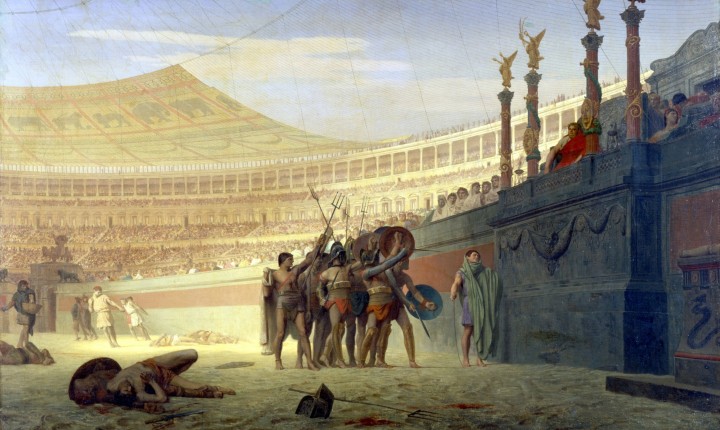A gladiator did not enter the games seeking revenge, the respect of the spectators, or to destroy his opponent because he despised him. His goal was survival, fueled by the pursuit of glory!
Glory is defined as great honor, praise, or distinction accorded by common consent.
It was glory in its most rudimentary form that drove the desires of a gladiator: the cheers of the crowds, the adoration of those who otherwise would scorn him for his slave status and his being held as for but a moment, as the glory of Rome.
As a gladiator, being in great favor with the crowds and being lauded by emperors and men of status certainly brought glory and elevated one high above their former rank and station as a lowly slave.
 The populace of ancient Rome was thrilled and delighted by the ludi, but as history tells us, emperors of the day too were enthralled by the games. It is written that Emperor Commodus took an active part in the games and made claims to have amassed over one thousand wins. It is also said that he had his conquests published in the city papers. Commodus clearly had glory as the head of the Roman Empire, but even he had the need to hear the crowds roar his name for his prowess in the arena. Emperor Tiberius was also seduced by the games, as he was known to offer popular retired gladiators large sums of money to return to the arena.
The populace of ancient Rome was thrilled and delighted by the ludi, but as history tells us, emperors of the day too were enthralled by the games. It is written that Emperor Commodus took an active part in the games and made claims to have amassed over one thousand wins. It is also said that he had his conquests published in the city papers. Commodus clearly had glory as the head of the Roman Empire, but even he had the need to hear the crowds roar his name for his prowess in the arena. Emperor Tiberius was also seduced by the games, as he was known to offer popular retired gladiators large sums of money to return to the arena.
Glory will make a man go to measures he ordinarily would not. The idea of being projected above all others—being looked up to for possessing the ability to do things most men could not—has driven men for centuries and still does, down to this very day. Freeborn men were known to take the gladiator’s oath and give up their freedom to partake in the games and try to gain their share of glory. The risk of death did not stand in their way. The allure of the frenzied spectators in a state of intoxication from the contest they had just witnessed chanting your name—not to mention cash purses paid by attaining that status—was certainly glorious.Glory will make a man go to measures he ordinarily would not.
Today, football players are recognized as modern day gladiators. Americans love to fill the arenas and watch their warriors in combat. Not surprisingly, over 40 percent of these fans are women and they too have their favorite warriors. According to NFLSHOP.com, the number one jersey purchased by women is that of Troy Polamalu. (Seriously? I would have thought Tom Brady [who is listed as 5th] or Tim Tebow [6th]). Women of ancient Rome were no different: they too had their favorites. They filled the arenas and chanted the name of their favorite hero. Graffiti discovered in the ruins of Pompeii noted “Caladus, suspirium peuellarum” (Caladus makes all the girls sigh). Even Eppia, the wife of a Roman senator, fell victim to the spell cast upon her by the gladiator Sergius. Though he was said to be an ugly man with a scarred head and a large wart on his nose, she left her position in life and her husband and eloped with him to Egypt.
Gladiators were the heroes of their day. Often, their lives were on the line, though not every contest ended in death as Hollywood would have us believe. The obvious fight for life was ever-present, but the fight for glory was even greater. What other slaves, in any time period, were cheered on by emperors, had once been free men who renounced their citizenship and legal status, and were known to make the women succumb to them? None! For there was no glory ever attached to any people held in captivity except for in this moment in history.The obvious fight for life was ever-present, but the fight for glory was even greater.
Related Posts
« Theatre Review—“Phantom” Gets a Makeover Get Ready and Plan for Action! »














